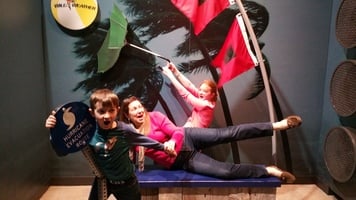Today is Father’s Day, a holiday that is observed in many other countries on different dates throughout the year. What you might not know is that the celebration has a religious history born out of tragedy -- one that serves as a reminder to cherish the fathers in our lives.
Grace Golden Clayton, a resident of Fairmont, West Virginia, was the first person on record to petition for Father’s Day. In December 1907, a mine explosion in a nearby town killed more than 360 men, many of them fathers. The tragedy left 1,000 children fatherless.
Clayton was distraught by the thought of all those children growing up without a father's guidance and wanted to do something to honor the importance of fatherhood. She asked the pastor at her local Methodist church to dedicate a day to honor fathers.
"This holiday was one etched in sadness as well as thankfulness," said the Rev. Donald Meighen, the retired pastor of the Central United Methodist Church, which was known as Williams Memorial Methodist Episcopal Church, South, when the first remembrance was held there. In 1985, the state erected a historical marker declaring Fairmont the birthplace of Father's Day. And every year, the church's congregation hears the story of the holiday's origins in a special Father's Day service. But the celebration did not spread to a wider audience at that time.
In 1909, another woman fought to start a Father’s Day tradition in Spokane, Washington. Sonora Smart Dodd heard a Mother’s Day sermon at the Central Methodist Episcopal Church in 1909, a year after Mother's Day officially kicked off at a Methodist church in Grafton, West Virginia.
The sermon reminded Dodd of her own mother, who died in childbirth and left her husband to raise their six children alone. Dodd was inspired to honor her father, and proposed the idea for a Father’s Day celebration to local religious leaders.
On June 19, 1910, pastors throughout Spokane delivered sermons honoring fathers, and news quickly spread around the country. In the following years, similar celebrations were held in Chicago, Miami and Portland, Oregon.
President Calvin Coolidge supported the idea of a national holiday in 1924, but it wasn’t until 1972, when President Richard Nixon made it a federal holiday, that it became permanent.


